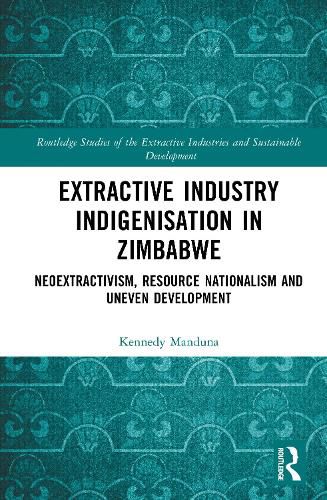Readings Newsletter
Become a Readings Member to make your shopping experience even easier.
Sign in or sign up for free!
You’re not far away from qualifying for FREE standard shipping within Australia
You’ve qualified for FREE standard shipping within Australia
The cart is loading…






This book explains how and why Zimbabwe's extractive industry Indigenisation over-promised its benefits yet under-delivered upon implementation.
This book traces the history of uneven development in Zimbabwe from the initial days of colonialism to the present, using the extractive industry as the unit of analysis to carve out a granular and empirical analysis of the preponderance of transnational corporate control and ownership in the country. Indigenisation of Zimbabwe's extractive industries was intended to address mining inequalities by transferring wealth from rich non-Indigenous mining capital to disadvantaged Indigenous citizens and communities. This policy, however, was a response to political, economic, and social crises posed by the international isolation of Zimbabwe's government following the controversial Fast Track Land Reform Programme in 2000-2003. An intervention, therefore, which promised to address inequalities has thus been hampered by corruption, co-optation, and collusion which has led to it not only failing to address uneven development, but in actual fact worsening the situation. By examining the hidden structures and infrastructures of power, capital, and minerals and placing extractive industry Indigenisation in capitalism, this book makes a crucial scholarly contribution to the renewed and burgeoning debates around the resurgence of resource nationalism in general and the struggle for economic sovereignty in particular. This book steers readers more broadly to look for new and diversified ways of empowering Indigenous populations and their communities through mining Indigenisation in ways that do not threaten economic and political stability.
This book will be of great interest to students and scholars of the extractive industries, natural resource management, African politics, and African development.
$9.00 standard shipping within Australia
FREE standard shipping within Australia for orders over $100.00
Express & International shipping calculated at checkout
This book explains how and why Zimbabwe's extractive industry Indigenisation over-promised its benefits yet under-delivered upon implementation.
This book traces the history of uneven development in Zimbabwe from the initial days of colonialism to the present, using the extractive industry as the unit of analysis to carve out a granular and empirical analysis of the preponderance of transnational corporate control and ownership in the country. Indigenisation of Zimbabwe's extractive industries was intended to address mining inequalities by transferring wealth from rich non-Indigenous mining capital to disadvantaged Indigenous citizens and communities. This policy, however, was a response to political, economic, and social crises posed by the international isolation of Zimbabwe's government following the controversial Fast Track Land Reform Programme in 2000-2003. An intervention, therefore, which promised to address inequalities has thus been hampered by corruption, co-optation, and collusion which has led to it not only failing to address uneven development, but in actual fact worsening the situation. By examining the hidden structures and infrastructures of power, capital, and minerals and placing extractive industry Indigenisation in capitalism, this book makes a crucial scholarly contribution to the renewed and burgeoning debates around the resurgence of resource nationalism in general and the struggle for economic sovereignty in particular. This book steers readers more broadly to look for new and diversified ways of empowering Indigenous populations and their communities through mining Indigenisation in ways that do not threaten economic and political stability.
This book will be of great interest to students and scholars of the extractive industries, natural resource management, African politics, and African development.